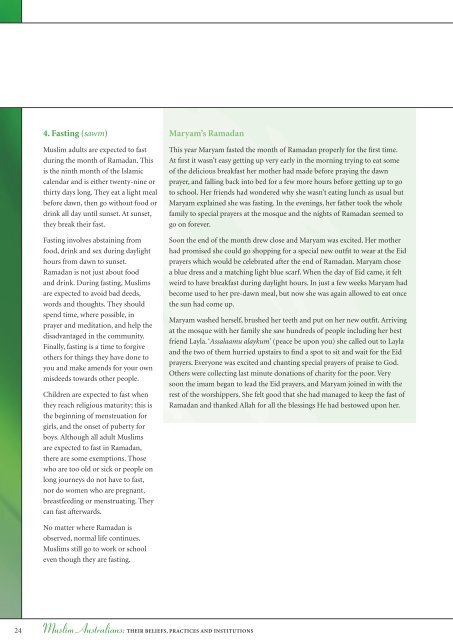Muslim Australians - Religion Cultural Diversity Resource Manual
http://www.islamicglobe.com
http://www.islamicglobe.com
You also want an ePaper? Increase the reach of your titles
YUMPU automatically turns print PDFs into web optimized ePapers that Google loves.
4. Fasting (sawm)<br />
<strong>Muslim</strong> adults are expected to fast<br />
during the month of Ramadan. This<br />
is the ninth month of the Islamic<br />
calendar and is either twenty-nine or<br />
thirty days long. They eat a light meal<br />
before dawn, then go without food or<br />
drink all day until sunset. At sunset,<br />
they break their fast.<br />
Fasting involves abstaining from<br />
food, drink and sex during daylight<br />
hours from dawn to sunset.<br />
Ramadan is not just about food<br />
and drink. During fasting, <strong>Muslim</strong>s<br />
are expected to avoid bad deeds,<br />
words and thoughts. They should<br />
spend time, where possible, in<br />
prayer and meditation, and help the<br />
disadvantaged in the community.<br />
Finally, fasting is a time to forgive<br />
others for things they have done to<br />
you and make amends for your own<br />
misdeeds towards other people.<br />
Children are expected to fast when<br />
they reach religious maturity; this is<br />
the beginning of menstruation for<br />
girls, and the onset of puberty for<br />
boys. Although all adult <strong>Muslim</strong>s<br />
are expected to fast in Ramadan,<br />
there are some exemptions. Those<br />
who are too old or sick or people on<br />
long journeys do not have to fast,<br />
nor do women who are pregnant,<br />
breastfeeding or menstruating. They<br />
can fast afterwards.<br />
Maryam’s Ramadan<br />
This year Maryam fasted the month of Ramadan properly for the first time.<br />
At first it wasn’t easy getting up very early in the morning trying to eat some<br />
of the delicious breakfast her mother had made before praying the dawn<br />
prayer, and falling back into bed for a few more hours before getting up to go<br />
to school. Her friends had wondered why she wasn’t eating lunch as usual but<br />
Maryam explained she was fasting. In the evenings, her father took the whole<br />
family to special prayers at the mosque and the nights of Ramadan seemed to<br />
go on forever.<br />
Soon the end of the month drew close and Maryam was excited. Her mother<br />
had promised she could go shopping for a special new outfit to wear at the Eid<br />
prayers which would be celebrated after the end of Ramadan. Maryam chose<br />
a blue dress and a matching light blue scarf. When the day of Eid came, it felt<br />
weird to have breakfast during daylight hours. In just a few weeks Maryam had<br />
become used to her pre-dawn meal, but now she was again allowed to eat once<br />
the sun had come up.<br />
Maryam washed herself, brushed her teeth and put on her new outfit. Arriving<br />
at the mosque with her family she saw hundreds of people including her best<br />
friend Layla. ‘Assalaamu alaykum’ (peace be upon you) she called out to Layla<br />
and the two of them hurried upstairs to find a spot to sit and wait for the Eid<br />
prayers. Everyone was excited and chanting special prayers of praise to God.<br />
Others were collecting last minute donations of charity for the poor. Very<br />
soon the imam began to lead the Eid prayers, and Maryam joined in with the<br />
rest of the worshippers. She felt good that she had managed to keep the fast of<br />
Ramadan and thanked Allah for all the blessings He had bestowed upon her.<br />
No matter where Ramadan is<br />
observed, normal life continues.<br />
<strong>Muslim</strong>s still go to work or school<br />
even though they are fasting.<br />
24 <strong>Muslim</strong> <strong>Australians</strong>:THEIR BELIEFS, PRACTICES AND INSTITUTIONS














